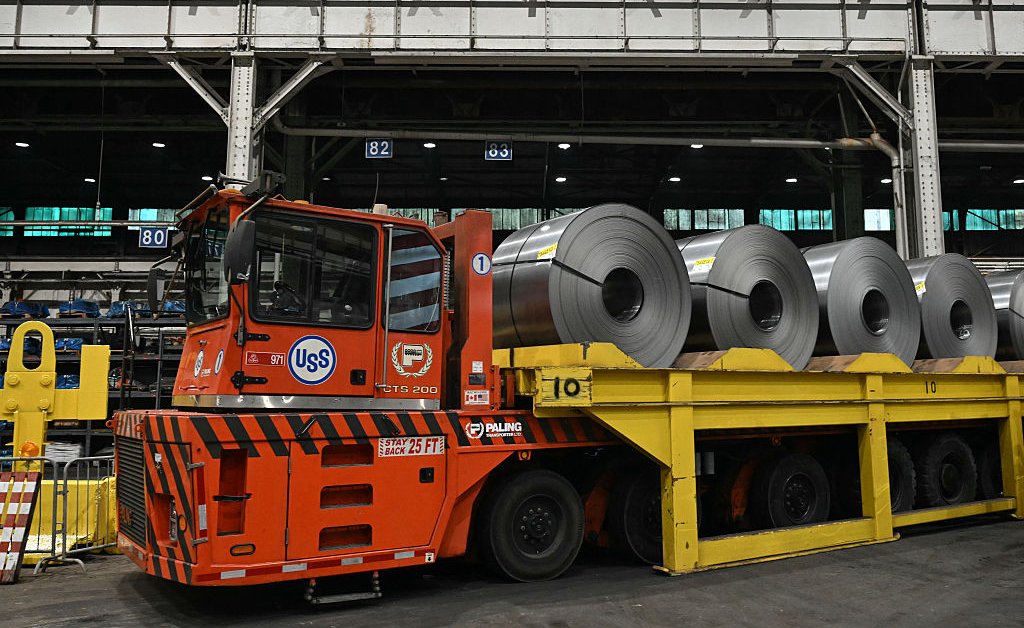Canned foods, cars, houses, and a range of other goods could soon get more expensive as businesses face a newly doubled tariff rate of 50% for steel and aluminum imports.
President Donald Trump described the increase, which raised the levies from the 25% rate announced in February beginning on Wednesday, as an effort to “further secure the steel industry in the United States” during a Friday rally at a steel mill in Pittsburgh, Penn.—once the heart of the domestic steel industry.
But while American steel industry groups have hailed the tariff hike, economic experts have sounded alarms, saying it could further disrupt the already volatile global supply chain and put more strain on businesses—and Americans’ wallets.
“Consumers will have to pay the price,” says Virginia Tech economics professor David Beiri. “The continued uncertainty that is created by the government is poisoning business plans.”
How will steel and aluminum tariff hikes impact businesses?
The United States is highly reliant on steel imports, bringing in more of the material from abroad than any other country in the world, according to the International Trade Administration. More than 26 million metric tons of steel were imported last year, most of which came from Brazil, Canada, Mexico, South Korea, and China.
“We are equally dependent on aluminum,” says Jonathan Colehower, managing director at consulting company UST.
The domestic steel industry has voiced support for the increased tariffs, saying they will help it weather increased competition from foreign steel manufacturers. “Chinese steel exports to the world have more than doubled since 2020, surging to 118 million MT in 2024—more than total North American steel production,” the American Iron and Steel Institute, one of several trade associations representing the American steel industry, said in a statement after Trump announced the higher rate. “This tariff action will help prevent new surges in imports that would injure American steel producers and their workers.”
But experts worry about the industry’s ability to meet increased demand as businesses, facing the additional import costs, seek cheaper alternatives for their products. While the U.S. once dominated the steel industry, the boom has died down in the last century. “With domestic capacity not necessarily being able to produce what we might need … there is going to be a transitory effect,” says Beiri, referring to the adjustment period the steel industry will have to navigate as the supply chain changes.
Colehower says the domestic steel supply may tighten as a result of the increased tariffs, which could cause domestic prices to rise amid high demand. “There’s absolutely no way it’s going to be able to make up the difference immediately,” he says of the domestic steel industry.
The Aluminum Association, a trade group that represents both U.S.-based and foreign companies, said it supports tariff-free Canadian aluminum, pointing to the American aluminum industry’s reliance on the country’s northern neighbor. “Aluminum is a critical material for our economy and national defense – used in everything from cars to beverage cans to fighter jets. Today, the United States is investing significantly and will need both smelted and recycled aluminum to meet growing demand,” the association said. “In the years if not decades it will take to build new U.S. smelter capacity, our metal needs must be met by importing.”
How will the higher tariffs impact the prices of goods?
Steel and aluminum are used in various products, from beer cans and office supplies to automobiles—the prices for all of which are likely to rise as a result of the doubled import taxes.
The Can Manufacturers Institute, the trade association of the metal can manufacturing industry, opposed the tariff increase in a statement after Trump announced the coming change in the rate, saying it would “further increase the cost of canned goods at the grocery store.” The can manufacturing industry imports nearly 80% of its tin-mill steel from foreign countries.
“Doubling steel tariffs will inflate domestic canned food prices, and it plays into the hands of China and other foreign canned food producers, which are more than happy to undercut American farmers and food producers,” the trade association said.
Beer companies and other beverage businesses are also set to be impacted.
The real estate and construction industries, both of which use steel to build homes, warehouses, and other structures, will be footing a bigger bill, as well, Colehower says. He predicts businesses such as Lowe’s and Home Depot, the latter of which vowed before the tariff hike that it would not be increasing the cost of its goods, will be severely affected. Farm equipment and transportation vehicles, including cars, bicycles, and others, will also likely cost more as a result of the new tariff rate, Colehower says.
Some companies could seek to adjust their business models in the face of increased costs. Coca-Cola CEO James Quincey, for instance, said in February that the company would consider making more beverages in plastic bottles to offset aluminum price hikes under the tariffs announced that month.
Negotiations over the tariffs are ongoing between the U.S. and its trading partners, several of which have expressed ire at the increased import taxes.
Bea Bruske, president of the Canadian Labour Congress, called the steel tariffs a “direct attack on Canadian workers.” A European Commission official on Friday said the decision “adds further uncertainty to the global economy and increases costs for consumers and businesses on both sides of the Atlantic.”
The U.K. has been spared from the tariff hike; Mexico announced Wednesday that it plans to ask for a similar exemption.
Canada, Mexico, and the European Union were previously exempt from steel and aluminum tariffs Trump imposed during his first term in 2016, but are subject to the current levies.
Read the full article here


